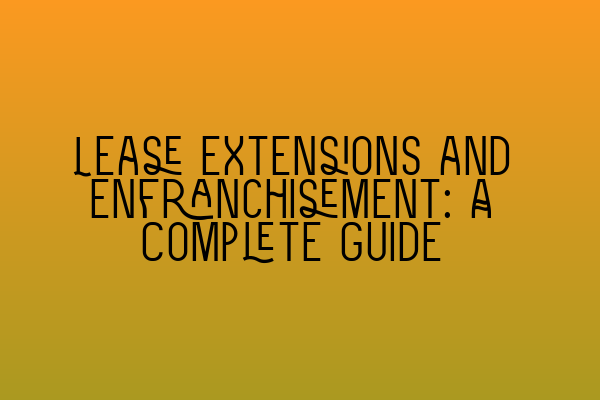Lease Extensions and Enfranchisement: A Complete Guide
As property owners, we often encounter situations where we need to extend the lease on our property or consider enfranchisement. Lease extensions and enfranchisement are legal processes that allow leasehold property owners to extend their lease or purchase the freehold of their property. In this complete guide, we will explore the key aspects of lease extensions and enfranchisement, and provide you with all the information you need to navigate the process successfully.
What is a Lease Extension?
A lease extension is the process of extending the term of a lease for a property. Leaseholders typically have the right to extend their lease by an additional 90 years on top of the existing term. Extending the lease is crucial for leasehold property owners as the value of the property diminishes as the lease term decreases. Therefore, a lease extension allows homeowners to maintain or enhance the value of their property.
How to Extend Your Lease
The process of extending your lease can be complex, but with the right guidance, it can be simpler than you might think. The first step is to consult a qualified solicitor who specializes in property law. They will guide you through the process, ensuring that you meet all the legal requirements and satisfy the necessary conditions.
The lease extension process typically involves the following steps:
1. Determine the Eligibility: Not all leaseholders are automatically eligible for a lease extension. Eligibility is dependent on several factors, including the length of your current leasehold, the type of property you own, and the number of years you have owned the property. Consulting a solicitor will help you determine your eligibility.
2. Serve a Notice: Once eligibility is confirmed, you need to serve a formal notice to your freeholder expressing your intention to extend the lease. This notice should include important details such as the proposed terms of the lease extension and a proposed premium for the extension.
3. Negotiation and Valuation: After serving the notice, negotiations will take place between you and the freeholder to agree on the terms and premium of the lease extension. It is essential to seek professional advice during this stage to ensure you are getting a fair deal.
4. Completion of the Lease Extension: Once the terms are agreed upon, the lease extension will be formalized through a legal process. This typically involves drafting a new lease agreement and registering it with the Land Registry.
Enfranchisement: Purchasing the Freehold
Enfranchisement is a process through which leasehold property owners can collectively purchase the freehold of their building or estate. This process is especially beneficial for property owners who want greater control over the management and maintenance of their property.
Collective Enfranchisement: The collective enfranchisement process allows leasehold property owners within a building or estate to come together as a group to purchase the freehold. This process is available to leaseholders who meet the eligibility criteria, which include a minimum number of leaseholders and a minimum percentage of participating leaseholders.
Individual Enfranchisement: Individual enfranchisement, also known as leaseholder’s right of first refusal, allows leasehold property owners to purchase the freehold of a single property when the freeholder decides to sell it. This right protects leaseholders from losing their property to an external buyer by offering them the opportunity to match the sale price and purchase the freehold themselves.
Key Benefits of Lease Extensions and Enfranchisement
Lease extensions and enfranchisement offer several benefits to property owners. Some of the key advantages include:
1. Increased Property Value: Extending your lease or owning the freehold can significantly increase the value of your property.
2. Greater Control: By extending your lease or purchasing the freehold, you gain greater control over the management and maintenance of your property.
3. Avoiding Ground Rent: Lease extensions and enfranchisement can help you avoid paying ground rent, providing you with greater financial freedom.
4. Peace of Mind: Knowing that you have a secure lease or own the freehold can offer peace of mind and long-term stability.
Conclusion
Understanding the intricacies of lease extensions and enfranchisement is essential for leasehold property owners. By extending your lease or enfranchising, you can ensure the long-term value and control of your property. However, navigating these legal processes can be challenging. That’s why it is crucial to consult a specialist property solicitor who can guide you through the process, ensuring that you meet all the legal requirements and achieve the best possible outcome.
If you need further assistance or have any questions regarding lease extensions, enfranchisement, or any other property law matter, do not hesitate to reach out to SQE Property Law & Land Law. Our team of experienced solicitors is here to help you navigate complex property transactions and protect your interests.
Related Articles:
– SQE 1 Practice Exam Questions
– SQE 1 Practice Mocks FLK1 FLK2
– SQE 2 Preparation Courses
– SQE 1 Preparation Courses
– SRA SQE Exam Dates
